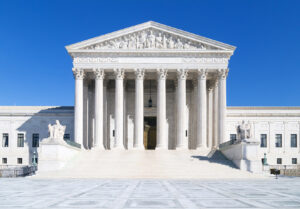In 2024, the most dangerous gatekeepers aren’t social media platforms and the threat of cancellation, but local, state and federal governments dictating what we can read and say.
By virtue of increasingly arcane algorithms enforcing content moderation, we tend to think of Big Tech as engaging in censorship that stifles freedom of speech. In The Markaz Review in March 2021, Andy Lee Roth of Project Censored and coauthor of The Media and Me: A Guide to Critical Media Literacy for Young People warned that “algorithms, artificial intelligence programs controlled by Big Tech companies” were the “new gatekeepers” engaging in “algorithmic censorship.”
While concerns about Big Tech and their proprietary algorithms remain valid, there is a vast difference between what Big Tech is doing and what local, state and federal Orwellian “Ministries of Truth” are doing. It’s the fundamental difference between private editorial and content decisions made every day by Google, Facetime, X and the other privately owned social media platforms (including, for that matter, the New York Times and The Markaz Review) and governmental laws and regulations that restrict what can be written, read, and taught.
In warning us about Big Brother in his dystopic novel Nineteen Eighty-Four, George Orwell was talking about the threat of government gatekeeping rather than the media. He worried that government would control everything that is written or spoken, destroying “any evidence that might conflict with or undermine the government’s interests.”
The word “censorship” gets thrown around a lot these days. Roth and other whistleblowers accuse Big Tech of “censoring” content on social media. “Censor” is derived from the system of magistrates established in ancient Rome in the 5th century BCE who acted as census takers, assessors, and inspectors of morals and conduct. Britannica defines censorship as “the changing or the suppression or prohibition of speech or writing that is deemed subversive of the common good. It occurs in all manifestations of authority to some degree, but in modern times it has been of special importance in its relation to government and the rule of law.”
Thus, while many may stretch the term “censorship” to cover the private editorial judgments of newspapers and social media platforms in deciding what to publish and post, the ugly history of censorship makes it very clear that the term more accurately refers to the power of the state to act as the gatekeeper over what one may say, write and read — backed by laws and officials, and police and civil or criminal punishments. A free society has a great deal to fear from such official gatekeepers. A social media gatekeeper may deplatform a user or remove his or her objectionable content, but a government gatekeeper can fine them or put them in jail. That’s a big difference.
Donald Trump aspires to be the Gatekeeper in Chief. Just take a look at Project 2025’s Mandate for Leadership, which envisions widespread changes to economic and social policies and the expansion of the powers of the federal government and its agencies. The plan proposes taking partisan control of the Department of Justice (DOJ), Federal Bureau of Investigation, Department of Commerce, Federal Communications Commission, and Federal Trade Commission; dismantling the Department of Homeland Security (DHS) and reducing environmental and climate change regulations to favor fossil fuels; instituting tax cuts; abolishing the Department of Education, whose programs would be transferred or terminated; cutting Medicare and Medicaid; rejecting abortion as health care; eliminating coverage of emergency contraception; enforcing the Comstock Act to prosecute those who send and receive contraceptives and abortion pills; criminalizing pornography; removing legal protections against discrimination based on sexual orientation and gender identity; terminating diversity, equity, and inclusion (DEI) programs and affirmative action by having the DOJ prosecute “anti-white racism”; stepping up the arrest, detention, and deportation of undocumented immigrants; deploying the military for domestic law enforcement; and promoting capital punishment and the speedy “finality” of those sentences.
This is gatekeeping on steroids. It should strike fear in every American.
In the U.S., the First Amendment prohibits government from being an official gatekeeper
The very first words of the First Amendment are “Congress shall make no law. . .” The government shall not do this. The First Amendment is a restriction on what the government can do. It does not say that social media platforms shall make no content moderation decisions any more than it says that newspapers and book publishers shall make no editorial decisions over what stories to run or books to publish. In fact, the First Amendment protects those editorial judgments. It is the law of the land that governments at all levels shall make no laws abridging freedom of speech or freedom of the press.
This is a solemn declaration, born of the Enlightenment and the jagged history of the United States: The American people do not want the government to serve as its gatekeeper — its Big Brother — controlling what we say or write or read.
In West Virginia State Board of Education v. Barnette (1943), the U.S. Supreme Court held that a public school could not compel a student to salute the U.S. flag or recite the Pledge of Allegiance. Justice Robert Jackson, in the majority opinion, famously wrote: “If there is any fixed star in our constitutional constellation, it is that no official, high or petty, can prescribe what shall be orthodox in politics, nationalism, religion, or other matters of opinion, or force citizens to confess by word or act faith therein.”
He added that the “very purpose of the Bill of Rights was to withdraw certain subjects from the vicissitudes of political controversy, to place them beyond the reach of majorities and officials and establish them as legal principles to be applied by the courts.” Jackson welcomed a free people deciding what to believe and what to say for themselves, free from government censorship.
“The purpose of the Constitution and Bill of Rights…was to take government off the backs of people,” wrote Justice William O. Douglas in Schneider v. Smith (1968). “The First Amendment’s ban against Congress ‘abridging’ freedom of speech [creates] a preserve where the views of the individual are made inviolate.”
We cannot engage in free thought and free expression if the government dogmatically restricts what we say. Orwell warned us that a government that tells us what we can say will inevitably tell us what we can think.
As 21st century gatekeepers, too many governments are using their power to ban books and control what is taught in public schools
We are witnessing an alarming rise in official gatekeepers in America. In April 2023, UCLA researchers released a study that found that in 2021 and 2022, federal, state, and local government officials introduced 563 measures aimed at restricting access to truthful information about race and systemic racism. The study was conducted by CRT Forward, an initiative of the UCLA School of Law’s Critical Race Studies Program, which defines critical race theory as the study of systemic racism in law, policy and society.
Many of these measures restrict or prohibit teaching the proposition that certain US institutions are “inherently” or “fundamentally” “racist.” Others target teaching subjects that cause students to feel “discomfort, guilt, anguish, or any other form of psychological distress on account of his or her race” or teach “individual responsibility for systemic racism.”
Researchers looked at the impact of former President Donald Trump’s Executive Order 13950, which banned certain “divisive concepts” in federal trainings. CRT Forward uses a database that comprehensively tracks anti-critical race theory measures at the federal, state, and local levels, including legislation, school board policies, gubernatorial executive orders, and state attorneys general opinions.
While Trump’s executive order was rescinded in January 2021 by incoming President Joe Biden, anti-critical race theory measures have been introduced in every state except Delaware. By the time the survey was released, 241 of the measures had been adopted. Fortunately, many are being successfully challenged in court.
“While this report looks to data from the recent past, its findings are integral to ensuring those committed to racial justice can chart a path forward that will allow everyone — especially our children — to have tools for addressing the most pressing racial and social justice issues of our time,” said Taifha Alexander, the CRT Forward project director and a co-author of the report.
BREAKING: Professor Danny Shaw Becomes Latest Victim of the Assault on Free Speech
Professor Danny Shaw, former heavyweight boxer and educator, was detained and interrogated by the FBI and DHS at Chicago’s O’Hare Airport on August 28, 2024, following his attendance at the Free… pic.twitter.com/eFEm0yrdPg
— DD Geopolitics (@DD_Geopolitics) August 30, 2024
Meanwhile, the anti-censorship group PEN America, in a survey of the 2022-23 school year, found that “freedom to read is under assault in the United States — particularly in public schools — curtailing students’ freedom to explore words, ideas, and books.” From July 1, 2022, to June 31, 2023, PEN America recorded 3,362 instances of book bans in US public school classrooms and libraries. These bans removed student access to 1,557 unique book titles, including the works of over 1,480 authors, illustrators, and translators.
Overwhelmingly, book bans targeted books on race or racism or featuring characters of color, as well as books with LGBTQ+ characters. Banned books also included books on physical abuse, health and well-being, and themes of grief and death. Notably, most instances of book bans affected young adult books, middle grade books, chapter books, or picture books — books specifically written and selected for younger audiences.
Authors whose books were targeted were most frequently female, people of color, and/or LGBTQ+ individuals. “Amid a growing climate of censorship, schoolbook bans continue to spread through coordinated campaigns by a vocal minority of groups and individual actors and, increasingly, as a result of pressure from state legislation,” the report found.
Over 40 percent of all book bans occurred in school districts in Florida. Across 33 school districts, PEN America recorded 1,406 book ban cases in Florida, followed by 625 bans in Texas, 333 bans in Missouri, 281 bans in Utah, and 186 bans in Pennsylvania. In August, Utah banned 13 books by seven authors, six of whom are women, ordering that the books were to be removed from all public classrooms and libraries.
In recent years, PEN America has been tracking “an evolving movement to exert ideological control over public education across the United States.” This campaign — which PEN America has dubbed the “Ed Scare,” an echo of the Red Scares during World War I and McCarthyism — is “penetrating public libraries, higher education institutions, and public schools, using state legislation and intimidation tactics to suppress teaching and learning about certain stories, identities, and histories.”
“Public schools have long been deemed essential to American democracy,” according to PEN America. John Adams called them “necessary for the preservation of rights and liberties” because public schools facilitate information sharing, knowledge building, and the ongoing unification that undergirds a pluralistic society. “School libraries play a critical role in making information and knowledge accessible to students,” PEN America points out, “while also fostering lifelong learning, student achievement, and literacy.”
students will hear a lot of bloviating talk at the beginning of the year from their university administrators who will urge them to be bold, to be brave, to think outside the box and disagree and then will send campus police to beat them up when they do just that
— abdullah 🇵🇸 (@AShihipar) September 4, 2024
And PEN America is not the only one sounding the alarm. According to the American Library Association (ALA), the number of titles targeted for censorship surged 65 percent in 2023 compared to 2022, reaching the highest levels it has ever documented. In 2023, there were efforts to censor 4,240 unique book titles in schools and libraries. This tops the previous high from 2022, when 2,571 unique titles were targeted for censorship, according to ALA’s Office for Intellectual Freedom.
The number of titles targeted for censorship at public libraries increased by 92 percent over the previous year while public school libraries saw an 11 percent increase.
Groups and individuals demanding the censorship of multiple titles — often dozens or hundreds at a time — drove this surge. Titles representing the voices and lived experiences of LGBTQIA+ and BIPOC individuals made up 47 percent of those targeted in censorship attempts, the ALA reported. There were attempts to censor more than 100 titles in each of 17 states: Colorado, Connecticut, Florida, Idaho, Illinois, Iowa, Kentucky, Maryland, Missouri, North Carolina, Ohio, Pennsylvania, Tennessee, Texas, Utah, Virginia, and Wisconsin.
“The reports from librarians and educators in the field make it clear that the organized campaigns to ban books aren’t over, and that we must all stand together to preserve our right to choose what we read,” said Deborah Caldwell-Stone, director of ALA’s Office for Intellectual Freedom. “Each demand to ban a book is a demand to deny each person’s constitutionally protected right to choose and read books that raise important issues and lift up the voices of those who are often silenced.”
Supreme Court confirms that the First Amendment protects social media platforms from state control of content moderation decisions
Official gatekeepers continue to flex their censorial muscles. In 2021, the Republican legislatures and Republican governors of Texas and Florida assumed the mantle of official gatekeepers to take revenge against social media, whom they blamed for contributing to Donald Trump’s defeat at the polls. Both states passed laws forcing platforms such as Facebook, Twitter, and YouTube to publish right-leaning content that these private sites would prefer not to publish. Gov. Greg Abbott admitted Texas’s law was enacted to stop a “dangerous movement by social media companies to silence conservative viewpoints and ideas.” The Eleventh Circuit enjoined most of the Florida law, while the Fifth Circuit upheld the Texas law.
The injunctions soon ended up in the Supreme Court. The much-anticipated cases, Moody v. NetChoice, LLC and NetChoice v. Paxton (collectively referred to as Moody), were decided in a single decision on July 1, 2024. To the relief of First Amendment advocates, the majority affirmed fundamental First Amendment principles in the context of social media, but the entire Court agreed that the factual record was insufficient to decide the facial challenge that NetChoice had filed, so the cases were remanded to the lower courts.
In her 31-page majority opinion, Justice Elena Kagan underscored the role the Constitution needs to play “in protecting those entities’ rights of speech, as courts have historically protected traditional media’s rights.” She was emphatic that, like the traditional press, social media platforms “are engaged in expression.” The Court has “repeatedly held that laws curtailing” the editorial choices of traditional media “must meet the First Amendment’s requirements. The principle does not change because the curated compilation has gone from the physical to the virtual world.”
As Kagan wrote, the First Amendment does not permit the government to force platforms “to carry and promote user speech that they would rather discard or downplay,” citing the seminal decision in Miami Herald Publishing Co. v. Tornillo (1974), which held that a newspaper has the right to final control over “the choice of material” it chooses to publish.
“At least on the current record,” she stressed, “the editorial judgments influencing the content of” Facebook’s NewsFeed and YouTube’s homepage are “protected expressive activity,” and “Texas may not interfere with those judgments simply because it would prefer a mix of messages.” Kagan pointed out that if Texas’s law were enforced, the platforms would not have the power to disfavor posts that do the following: support Nazi ideology; advocate for terrorism; espouse racism, Islamophobia, or anti-Semitism; glorify rape or other gender-based violence; encourage teenage suicide and self-injury; discourage the use of vaccines; advise phony treatments for diseases; or advance false claims of election fraud. The point is that “Texas’s law profoundly alters the platforms’ choices about the views they will, and will not, convey.”
It is a good sign that in Moody the majority of Supreme Court justices, across the ideological spectrum, rejected the attempts by Texas and Florida to act as gatekeepers over what private social media platforms decide to post. The opposite result would have posed a grave danger to the First Amendment.
Sarah Wilkinson’s arrest is a chilling reminder of the UK government’s increasing crackdown on free speech. Arrested for her online activism, this is an alarming assault on human rights and dissent. #FreeSarahWilkinson #StandWithSarah
more: https://t.co/AbQpwwQjLf pic.twitter.com/iRIYkTqumw— Arab Organisation (@AohrUk) August 30, 2024
In a free society, we should scrutinize social media gatekeepers and dismantle government gatekeepers
As we look ahead, how should a society that boasts a deep commitment to freedom of expression grapple with the potential power of private and public gatekeepers?
Project Censored’s Andy Roth wisely encouraged us to “exert all possible pressure to force corporations such as Google and Facebook to make their algorithms available for third-party scrutiny; at the same time, we must do more to educate the public about this new and subtle wrinkle in the news production process.” Fortunately, aside from a single reference that “governmental regulation or pending lawsuits may eventually force Big Tech companies to make their algorithms available for third-party scrutiny,” Roth did not embrace the kind of government intervention that Texas and Florida attempted.
Instead, he offered several things that users can do to redress the sins of Big Tech: “Remember search engines and social media feeds are not neutral information sources. The algorithms that drive them often serve to reproduce existing inequalities in subtle but powerful ways. Investigate for yourself. Select a topic of interest to you and compare search results from Google and DuckDuckGo.”
He also encouraged us to connect directly to news organizations “that display firm commitments to ethical journalism, rather than relying on your social media feed for news.” And “call out algorithmic bias when you encounter it.”
Roth’s approach of empowering users to learn how algorithms work — caveat emptor — is fully aligned with the First Amendment’s protection for intellectual autonomy. Some of us grew up learning “not to trust everything you read in the newspaper.” Now a new generation needs to learn “not to trust everything you read online.”
But we also cannot ignore the rapacious appetite of politicians and government officials to use their power to ban books, to restrict curricula in public schools, and to control social media. We need to elect people who understand the limitations imposed on them by the Constitution. We need parents to take an active role in school board elections to ensure that those elected refrain from imposing their political agendas on what textbooks our students read and what subjects they are taught in the classroom.
We need to elect representatives, senators, and presidents who disavow any ambition to serve as gatekeepers over the minds of their constituents and who pledge to nominate and confirm to the Supreme Court justices who will uphold the fundamental principle “that no official, high or petty, can prescribe what shall be orthodox in politics, nationalism, religion, or other matters of opinion.”
As free people, we do not need official gatekeepers. Each of us is our own gatekeeper.



























